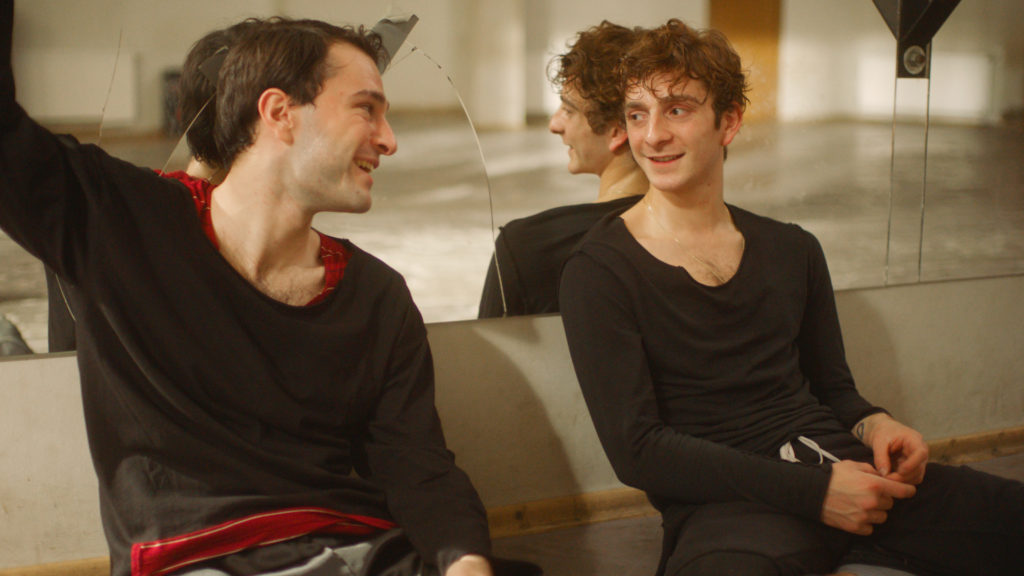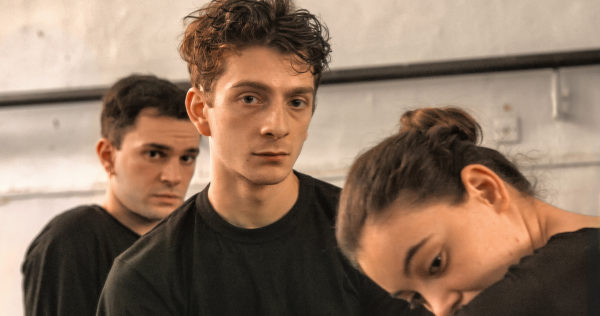Sweden’s selection for the Oscars’ newly renamed “Best International Film” category is not set in Stockholm or Gothenburg but the nation of Georgia, in the former Soviet republic. And Then We Danced, opening on February 7 from Music Box Films, finds Swedish-born director Levan Akin returning to his roots as the son of Georgian parents who emigrated from Turkey. His poignant drama centers on Merab (Levan Gelbakhiani), a folk dancer hoping to join the National Georgian Ensemble, whose world is shaken by the arrival of a new, charismatic, irreverent male dancer, Irakli (Bachi Valishvili). By mid-film, they are no longer able to resist their mutual attraction—a risky gambit in a culture that scorns homosexuality.

Akin says that when he embarked on the project, “I didn’t know what it was going to become. The genesis of the idea came from a pride parade in Tbilisi that was attacked by a mob. That prompted me to go to Georgia—I wanted to check the situation out and see how it could be as bad as it is. It actually surprised me and also deeply offended me as a Georgian that this could happen. I interviewed a lot of young Georgians, both LGBTQ and also anybody who would basically talk to me about life in Georgia, and they would add me on Instagram and we would become friends. And then the algorithm suggested Levan Gelbakhiani, like ‘You might know this person’—it’s one good thing that came from social media. And I looked at him and I saw that he was a dancer, and by then I’d already thought that dance would be a nice way to showcase the traditions of Georgia.”
Akin set up a meeting and found Gelbakhiani “very magnetic, but he was also very shut off—he’s quite shy.” The director filmed a teaser with the novice actor to attract financing, “and it turned out pretty OK. But a lot of the comments were that he was guarding himself. I decided that I wanted to go with him anyway, because I really liked him.” As Akin continued to research the film, “we got to know each other very closely, and by the time we started filming, there was really no filter between us—it was almost like the camera wasn’t there. But he’s not a professional actor, he’s a dancer. So I had to work with him in different ways to get the performance—a lot of the emotions that you see on screen are really in the moment. One of the challenges for me was that if he did a good take of something, I could never get that again. It was always different.” In November, this first-time actor was nominated for a European Film Award.
Akin’s other lead, Valishvili, had some theater experience but had never made a film before. “He’s like an old Hollywood star, like Errol Flynn or something,” Akin says. “I hope that he will get some offers, because his English is flawless. He taught himself by watching YouTube. So sweet.”
Akin recalls that Valishvili was the third actor to test opposite Gelbakhiani, “and I saw that Levan sort of blushed when they met. When I saw the blush, I was like, OK, this is good chemistry; I found the other guy.”

Did his actors have any reservations about taking on these groundbreaking roles? “Not Bachi—he told me later that he thought about it and asked his friends, but Levan had more reservations. The first time my casting agent called him, he didn’t even want to take the meeting—he was like, no, I’m not interested. And then after we met, he was intrigued. Then he was really engaged in the process as soon as he said yes. He talked to his parents and to his friends, and they were like, if you want to do it, we support you. So there are people in Georgia who are open-minded and understand that it’s just a film.”
But there remain many close-minded people in that country. “It was a very challenging shoot because we filmed secretly—we didn’t tell people what we were doing. We had an alternate story. We would say that we were making a movie about a French tourist who comes to Georgia and falls in love with the culture. And inevitably some people found out what we were doing, and we had to have security guards on set and we got death threats. It was really intense—we would lose locations just the night before, and I would have to rethink. So this script never really had a beginning, a middle, and an end—I just threw everything else away because I had to be so flexible. Everything in the film is based on the interviews I did with people. All of the stories are true. A lot of the people in the film are real people that I met in my research. So it’s almost like a hybrid film—even though it has this linear or classical story, it’s very organic the way the film grew.”
Ironically, Akin notes, “Georgia is one of the most progressive countries in the region when it comes to LGBTQ issues because there are laws protecting them, but they’re not implemented. It’s more like a cosmetic thing—it feels like they have them in place because they should have them and they want to come closer to the West and the E.U. and they get E.U. funding and stuff. But when it actually comes down to it, it’s one of the most homophobic countries in the world. However, there is a parallel world with a gay subculture. The people in Georgia are so divided: You have the young generation who grew up on the internet and who have different news sources and other references, and then you have their parents’ generation, who are more like the Soviet mentality, and then the Church is very strong.
“This film has hit like a bomb there. When we premiered in Cannes, nobody knew about the movie, and then the trailer released and so many people are supporting it. Media has been super-supportive of the movie in Georgia. I get so many messages from kids, not just from Georgia but from Poland and Uzbekistan, kids who watched the trailer. After our screening in Zurich, a girl came up to us shaking—she’d flown all the way from Russia to see the film. So it’s really making a difference, which is so surreal to me.”
We met with Akin in New York just after the film’s screening at the annual gay film festival and 10 days before its premiere in Tbilisi, where hundreds of protesters tried to block the entrance to the cinema, and smoke bombs and firecrackers were thrown.
Akin has received a markedly different response to the film in other parts of the world. “Both in Sweden and when we showed the film in Mill Valley [in California], older women have come up to me and told me, ‘You know, those [sex] scenes were really erotic to me. I’ve seen many gay scenes, but I’ve never felt that they were so erotic and real.’ Another woman in Sweden told me that she’d never seen a scene with same sex, and it wasn’t until after that she was like, ‘Oh yeah, they were the same sex. It felt so natural.’ I don’t know what it is about them that makes people feel that way—maybe they’re very organic somehow.”
Reflecting on his heritage, Akin says, “I always had a rose-tinted view of Georgia growing up, because of my parents. You can feel in the film that I love the culture and the music and the dance and everything, but there are also a lot of problems there. Working there as much as I did, I could see Georgia in a different way. I also sort of lived through the main character, experiencing first love again through him. I’m 40 now, so it brought up a lot of emotions. One of the themes is how youth is lost on the young and how quickly it can change. One day you’re happy dancing to Abba on a balcony, and you don’t know what you’re saying goodbye to because it happens so fast.”
Akin sees And Then We Danced as a major turning point in his career. “Back in Sweden, before I made this film, I had done a lot of TV series and I did two movies, but none have been as personal. This was like a rejuvenation of my filmmaking. I worked from a place only of curiosity and I didn’t decide a lot of things. It was a different process from how you usually make films, where everything is about planning. And since I couldn’t plan, which in the beginning freaked me out, I had to let go of all my control issues and just go with the flow and see what I was served and use that and be creative with it. But that was actually a really fun way to work. It gave me energy, because from one day to the next I didn’t know what I was going to get.”
Asked about his experience as a Georgian working in the Swedish film industry, Akin responds, “For all intents and purposes, I am Swedish, because I was born and raised in Sweden. So it’s really not something I think about. But I’m also Georgian, and I have that temperament. I’m a little different from your regular Swede. It’s a good question.”
Still, he concedes, “Early on when I was applying to film schools, I never got into the main film school in Sweden. I applied two times, and I felt like they wanted to pigeonhole me—they wanted me to be this foreign kid from the hood or something. And when I didn’t match their mold, they didn’t know what to do with me. … I’ve felt that many times in my life. Unfortunately, Sweden is becoming in many ways more and more racist. One of our biggest parties is former Nazis—I mean, they still are probably Nazis, but now they pretend they’re not. It’s insane. In the latest polling, they were like the second biggest party in Sweden. It’s so scary. I’m very sad.”
He continues, “Sweden has changed in the last 10 years, and that’s something that was really on my mind when I was making this film. I wanted to make a film about tradition and culture in a hopeful way, a nonaggressive way. Just tell people that nobody can decide for you what your tradition or your culture should be. That’s not up to these right-wing people: Oh, if you’re a Georgian dancer, if you’re a Georgian, you need to tick these boxes. It’s the same in Sweden: Oh, you need to own a cat and love cinnamon buns and you need to celebrate Christmas, otherwise you’re not Swedish and you don’t love our culture. And I want to say, I can be Swedish in any way I want, as I can be Georgian in any way I want. There are Georgians telling me that I’m not a real Georgian too, and that’s not up to anybody else to decide. I feel like a lot of us have left that conversation to the crazy bigots and let them hijack that. And I want to be like, no, I’m taking it back. I am proud to be Swedish, I’m going to hang the Swedish flag, and I’m gonna talk about what it really means to be Swedish. Because what it really means to be Swedish is to be open and curious. And I think that conversation can probably be had here in America too, from what I understand.”



Share this post